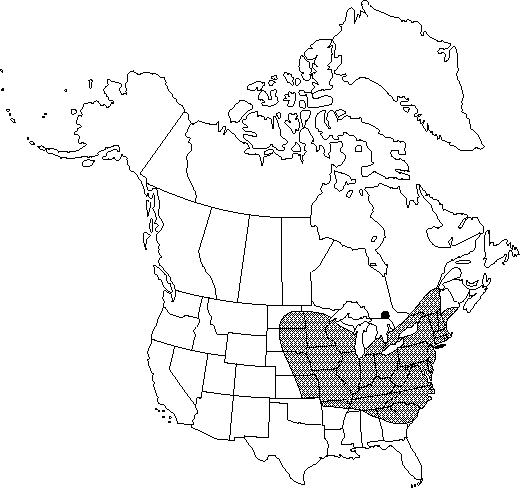Difference between revisions of "Humulus japonicus"
Abh. Math.-Phys. Cl. Königl. Bayer. Akad. Wiss 4(3): 213. 1846.
FNA>Volume Importer |
FNA>Volume Importer |
||
| Line 24: | Line 24: | ||
}}<!-- | }}<!-- | ||
| − | --><span class="statement" id="st- | + | --><span class="statement" id="st-undefined" data-properties=""><b>Herbs,</b> annual, vining, 0.5-2.5 m. <b>Stems</b> usually branched. <b>Leaves</b>: petioles usually longer than blades. <b>Leaf</b> blade cordate, palmately 5-9-lobed, 5-12 cm, margins of lobes serrulate, apex acuminate; surfaces abaxially with veins pubescent, with stiff hairs, glands yellow, sessile, discoid, adaxially margins of younger leaf blades with stiff cystolithic hairs. <b>Inflorescences</b>: staminate inflorescences erect, 15-25 cm, flower anthers without glands; pistillate inflorescences spikes, conelike, ovoid; bracteole ovate-orbiculate, 7-10 mm, pilose, margins densely ciliate-hairy. <b>Infructescences</b> pendulous, green, conelike, ovoid to oblong, (1-)1.5-3(-4) cm; bracteoles without yellow glands. <b>Achenes</b> yellow-brown, ovoid-orbicular, inflated to lenticular, 4-5 mm, glandless. <b>2n</b> = 20, including 6 chromosomes concerned with sex determination.</span><!-- |
-->{{Treatment/Body | -->{{Treatment/Body | ||
| Line 30: | Line 30: | ||
|habitat=Roadsides, fencerows, waste places, riverbanks | |habitat=Roadsides, fencerows, waste places, riverbanks | ||
|elevation=0-1000 m | |elevation=0-1000 m | ||
| − | |distribution=Ont.;Que.;Ala.;Ark.;Conn.;Del.;Ga.;Ill.;Ind.;Iowa;Kans.;Ky.;Maine;Md.;Mass.;Mich.;Minn.;Mo.;Nebr.;N.J.;N.Y.;N.C.;N.Dak.;Ohio;Pa.;R.I.;S.C.;S.Dak.;Tenn.;Vt.;Va.;W.Va.;Wis.;Asia | + | |distribution=Ont.;Que.;Ala.;Ark.;Conn.;Del.;Ga.;Ill.;Ind.;Iowa;Kans.;Ky.;Maine;Md.;Mass.;Mich.;Minn.;Mo.;Nebr.;N.J.;N.Y.;N.C.;N.Dak.;Ohio;Pa.;R.I.;S.C.;S.Dak.;Tenn.;Vt.;Va.;W.Va.;Wis.;Asia. |
|discussion=<p>Although I have no records from New Hampshire, the state is within the geographic range of Humulus japonicus.</p><!-- | |discussion=<p>Although I have no records from New Hampshire, the state is within the geographic range of Humulus japonicus.</p><!-- | ||
--><p>Variegated forms of Humulus japonicus, cultivated as ornamentals, are sometimes spontaneous. The vernacular name Japanese hop(s) is occasionally misapplied to H. lupulus var. cordifolius (Miquel) Maximowicz, a variety not found in North America.</p><!-- | --><p>Variegated forms of Humulus japonicus, cultivated as ornamentals, are sometimes spontaneous. The vernacular name Japanese hop(s) is occasionally misapplied to H. lupulus var. cordifolius (Miquel) Maximowicz, a variety not found in North America.</p><!-- | ||
| Line 53: | Line 53: | ||
|habitat=Roadsides, fencerows, waste places, riverbanks | |habitat=Roadsides, fencerows, waste places, riverbanks | ||
|elevation=0-1000 m | |elevation=0-1000 m | ||
| − | |distribution=Ont.;Que.;Ala.;Ark.;Conn.;Del.;Ga.;Ill.;Ind.;Iowa;Kans.;Ky.;Maine;Md.;Mass.;Mich.;Minn.;Mo.;Nebr.;N.J.;N.Y.;N.C.;N.Dak.;Ohio;Pa.;R.I.;S.C.;S.Dak.;Tenn.;Vt.;Va.;W.Va.;Wis.;Asia | + | |distribution=Ont.;Que.;Ala.;Ark.;Conn.;Del.;Ga.;Ill.;Ind.;Iowa;Kans.;Ky.;Maine;Md.;Mass.;Mich.;Minn.;Mo.;Nebr.;N.J.;N.Y.;N.C.;N.Dak.;Ohio;Pa.;R.I.;S.C.;S.Dak.;Tenn.;Vt.;Va.;W.Va.;Wis.;Asia. |
|introduced=true | |introduced=true | ||
|reference=None | |reference=None | ||
| Line 59: | Line 59: | ||
|publication year=1846 | |publication year=1846 | ||
|special status=Weedy;Introduced | |special status=Weedy;Introduced | ||
| − | |source xml=https://jpend@bitbucket.org/aafc-mbb/fna- | + | |source xml=https://jpend@bitbucket.org/aafc-mbb/fna-data-curation.git/src/9216fc802291cd3df363fd52122300479582ede7/coarse_grained_fna_xml/V3/V3_760.xml |
|genus=Humulus | |genus=Humulus | ||
|species=Humulus japonicus | |species=Humulus japonicus | ||
| − | |||
| − | |||
| − | |||
| − | |||
| − | |||
| − | |||
| − | |||
| − | |||
| − | |||
| − | |||
| − | |||
| − | |||
| − | |||
| − | |||
| − | |||
| − | |||
| − | |||
| − | |||
| − | |||
| − | |||
| − | |||
| − | |||
| − | |||
| − | |||
| − | |||
| − | |||
| − | |||
| − | |||
| − | |||
| − | |||
| − | |||
| − | |||
| − | |||
| − | |||
| − | |||
}}<!-- | }}<!-- | ||
-->[[Category:Treatment]][[Category:Humulus]] | -->[[Category:Treatment]][[Category:Humulus]] | ||
Revision as of 14:49, 27 July 2019
Herbs, annual, vining, 0.5-2.5 m. Stems usually branched. Leaves: petioles usually longer than blades. Leaf blade cordate, palmately 5-9-lobed, 5-12 cm, margins of lobes serrulate, apex acuminate; surfaces abaxially with veins pubescent, with stiff hairs, glands yellow, sessile, discoid, adaxially margins of younger leaf blades with stiff cystolithic hairs. Inflorescences: staminate inflorescences erect, 15-25 cm, flower anthers without glands; pistillate inflorescences spikes, conelike, ovoid; bracteole ovate-orbiculate, 7-10 mm, pilose, margins densely ciliate-hairy. Infructescences pendulous, green, conelike, ovoid to oblong, (1-)1.5-3(-4) cm; bracteoles without yellow glands. Achenes yellow-brown, ovoid-orbicular, inflated to lenticular, 4-5 mm, glandless. 2n = 20, including 6 chromosomes concerned with sex determination.
Phenology: Flowering early-mid summer.
Habitat: Roadsides, fencerows, waste places, riverbanks
Elevation: 0-1000 m
Distribution

Ont., Que., Ala., Ark., Conn., Del., Ga., Ill., Ind., Iowa, Kans., Ky., Maine, Md., Mass., Mich., Minn., Mo., Nebr., N.J., N.Y., N.C., N.Dak., Ohio, Pa., R.I., S.C., S.Dak., Tenn., Vt., Va., W.Va., Wis., Asia.
Discussion
Although I have no records from New Hampshire, the state is within the geographic range of Humulus japonicus.
Variegated forms of Humulus japonicus, cultivated as ornamentals, are sometimes spontaneous. The vernacular name Japanese hop(s) is occasionally misapplied to H. lupulus var. cordifolius (Miquel) Maximowicz, a variety not found in North America.
The disposition of the name Humulus scandens (Loureiro) Merrill, based on Antidesma scandens Loureiro, is problematic. E. D. Merrill (1935) was convinced that the name A. scandens applied to the species Humulus japonicus. If Merrill was correct, then the combination Humulus scandens would have priority. The material described by Loureiro, however, was not preserved, and his description does not coincide with that of H. japonicus. Humulus scandens is not included in synonymy in this treatment.
I. A. Grudzinskaya (1988) segregated Humulus japonicus as a new monotypic genus, Humulopsis, with the single species Humulopsis scandens (Loureiro) Grudzinskaya.
Selected References
None.